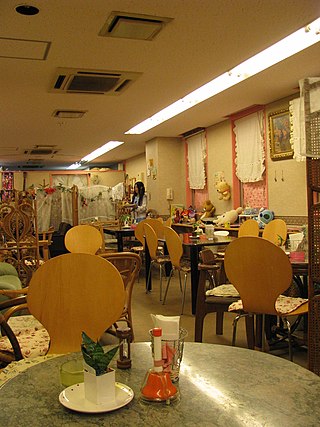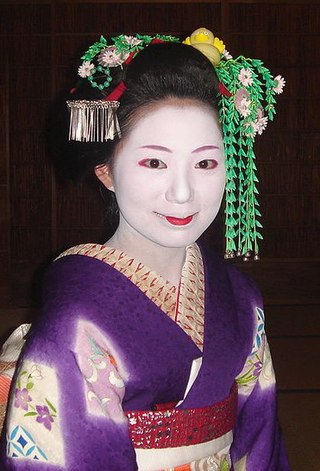Gender studies is an interdisciplinary academic field devoted to analysing gender identity and gendered representation. Gender studies originated in the field of women's studies, concerning women, feminism, gender, and politics. The field now overlaps with queer studies and men's studies. Its rise to prominence, especially in Western universities after 1990, coincided with the rise of deconstruction.

Salaryman is an originally Japanese word for salaried workers. In Japanese popular culture, it is portrayed as a white-collar worker who shows unwavering loyalty and commitment to his employer.
Fat fetishism or adipophilia is a sexual attraction directed towards overweight or obese people due primarily to their weight and size.
The social construction of human sexuality and sexual behavior—along with its taboos, regulation, and social and political impact—has had a profound effect on the various cultures of the world since prehistoric times.
Anne Allison is a professor of cultural anthropology at Duke University in the United States, specializing in contemporary Japanese society. She wrote the book Nightwork on hostess clubs and Japanese corporate culture after having worked at a hostess club in Tokyo.
A hostess club is a type of night club found primarily in Japan which employs mostly female staff and caters to men seeking drinks and attentive conversation. Host clubs are a similar type of establishment where mostly male staff attend to women. Host and hostess clubs are considered part of mizu shōbai, the night-time entertainment business in Japan.
Nightwork is shift work which is carried out at night.

Cynthia Holden Enloe is an American political theorist, feminist writer, and professor. She is best known for her work on gender and militarism and for her contributions to the field of feminist international relations. She has also influenced the field of feminist political geography, with feminist geopolitics in particular.
No-pan kissa are Japanese sex establishments offering food and drinks served by waitresses wearing short skirts with no underwear. The floors, or sections of the floor, were sometimes mirrored.
Timeline of anthropology, 1990–1999

Maid cafés are a subcategory of cosplay restaurants found predominantly in Japan and Taiwan. In these cafés, waitresses, dressed in maid costumes, act as servants, and treat customers as masters as if they were in a private home, rather than as café patrons. The first permanent maid café, Cure Maid Café, was established in Akihabara, Tokyo, Japan, in March 2001, but maid cafés are becoming increasingly popular. The increased competition drove the cafes to employ more diversified themes, gimmicks and even unusual tactics to attract customers. They have also expanded overseas to several countries around the world.
Feminist sexology is an offshoot of traditional studies of sexology that focuses on the intersectionality of sex and gender in relation to the sexual lives of women. Sexology has a basis in psychoanalysis, specifically Freudian theory, which played a big role in early sexology. This reactionary field of feminist sexology seeks to be inclusive of experiences of sexuality and break down the problematic ideas that have been expressed by sexology in the past. Feminist sexology shares many principles with the overarching field of sexology; in particular, it does not try to prescribe a certain path or "normality" for women's sexuality, but only observe and note the different and varied ways in which women express their sexuality. It is a young field, but one that is growing rapidly.
Nada Inada was the pen-name of a Japanese psychiatrist, writer and literary critic active in late Shōwa period and early Heisei period Japan. His pen name is from the Spanish language phrase "nada y nada".

Sexuality in Japan developed separately from that of mainland Asia, as Japan did not adopt the Confucian view of marriage, in which chastity is highly valued. Monogamy in marriage is often thought to be less important in Japan, and sometimes married men may seek pleasure from courtesans. Prostitution in Japan has a long history, and became especially popular during the Japanese economic miracle, as evening entertainments were tax-deductible. Decreased sex drive in the 21st century has been blamed for the low Japanese birth rate and declining growth of the Japanese population.
Ganbaru, also romanized as gambaru, is a ubiquitous Japanese word which roughly means to slog on tenaciously through tough times.
Feminist views on BDSM vary widely from acceptance to rejection. BDSM refers to bondage and discipline, dominance and submission, and Sado-Masochism. In order to evaluate its perception, two polarizing frameworks are compared. Some feminists, such as Gayle Rubin and Patrick Califia, perceive BDSM as a valid form of expression of female sexuality, while other feminists, such as Andrea Dworkin and Susan Griffin, have stated that they regard BDSM as a form of woman-hating violence. Some lesbian feminists practice BDSM and regard it as part of their sexual identity.

Dude, You're a Fag: Masculinity and Sexuality in High School is a 2007 book by the sociologist C. J. Pascoe. Through ethnographic research, Pascoe examines masculinity in high schools. Pascoe's work proposes that masculinity is defined primarily through dominance and control. Further, masculinity is established by high school boys through their use of the fag (faggot) epithet. This book explores masculinity as enacted by male and female students, the consequences of a strict gender system, heteronormativity within the school system, racialized masculine ideals, and acts of resistance to the gendered social order. Pascoe conducted fieldwork for a year and a half at "River High School", conducted formal interviews with fifty students, and informal interviews with many other students, administrators and faculty members.
Prostitution, as defined under modern Japanese law, is the illegal practice of sexual intercourse with an 'unspecified' (unacquainted) person in exchange for monetary compensation, which was criminalised in 1956 by the introduction of article 3 of the Anti-Prostitution Law. However, the definition of prostitution made illegal under this law is strictly limited to sexual intercourse with an 'unspecified person', and does not criminalise the sale of numerous other acts performed by sex workers in exchange for compensation, such as oral sex, anal sex, mammary intercourse, and other non-coital sex acts; the Businesses Affecting Public Morals Regulation Law of 1948, also known as the "Law to Regulate Adult Entertainment Businesses", amended in 1985, 1999 and 2005, regulates these businesses, making only one definition of prostitution in Japan illegal.
Scholarship on nationalism and gender explores the processes by which gender affects and is impacted by the development of nationalism. Sometimes referred to as "gendered nationalism," gender and nationalism describes the phenomena whereby conceptions of the state or nation, including notions of citizenship, sovereignty, or national identity contribute to or arise in relation to gender roles.
Andrea Cornwall is Professor of Global Development and Anthropology at King's College London.





